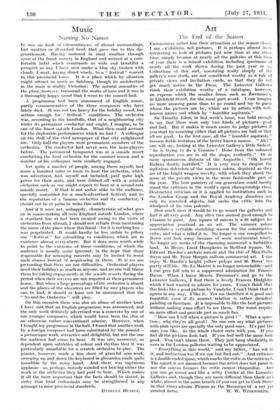Music Naming No Names
IT was no fault of circumstances, of dismal surroundings, bad weather or ill-cooked food, that gave rise to this dis- gruntlement. Having motored in ideal weather through some of the finest scenery in England and arrived at a com- fortable hotel which commands as wide and beautiful a prospect as any I have seen under a blue sky broken with clouds, I went, having dined wisely, to a " festival " concert in this provincial town. It is a place which by situation might attract as much as Salzburg, though its architecture in the main is stuffily Victorian: The natural amenities of the place, however, transcend the works of man and it was in a thoroughly happy mood that I went to the concert-hall.
A programme had been announced of English music, partly commemorative of the three composers who have lately died. It was not too heavy for the holiday mood, but serious enough for " festival" conditions. The orchestra was, according to the handbills, that of a neighbouring city under its permanent conductor and ought, I imagine, to be one of the finest outside London. What then could account for the deplorable performances which we had ? A colleague on the staff of the chief newspaper of that city enlightened me. Only half the players were permament members of the orchestra. The conductor had never seen the horn-players before. The permanent tympanist was at a seaside resort conducting the local orchestra for the summer season and a number of his colleagues were similarly engaged.
Yet quite a number of people, among them myself, had come a hundred miles or more to hear the orchestra, which was advertised, had, myself not included, paid quite high prices for their seats, and were fobbed off with a scratch orchestra such as one might expect to hear at a second-rate seaside resort. If that is not unfair alike to the audience, specially assembled for a much-advertised festival, and to the reputation of a famous orchestra and its conductor, I should not be at pains to write this article.
And if it were not, unhappily, characteristic of what goes on in music-making all over England outside London, where a standard has at last been created owing to the visits of orchestras from abroad, I should not refrain from mentioning the name of the place where this fraud—for it is nothing less— was perpetrated. It would hardly be less unfair to pillory one festival " for submitting to conditions which are in existence almost everywhere. But it does seem worth while to point to the existence of those conditions, of which the audience is usually quite ignorant, in the hope that those responsible for arranging concerts may be incited to resist such abuses instead of acquiescing in them. It is no use pretending that there are not difficulties. Orchestral players need their holidays as much as anyone, and no one will blame them for taking engagements at the seaside resorts during the period when their services are not required at their permanent home. But when a large percentage of the orchestra is absent and the places of the absentees are filled by any players who can be had, it should at least not be announced that the " So-and-So Orchestra " will play.
On this occasion there was also an abuse of another kind. I have said that an English programme was announced, and the only work definitely advertised was a concerto by one of our younger composers, which would have been the clou of an otherwise rather conventional scheme. However, when I bought my programme in the hall, I found that another work by a foreign composer had been substituted by the pianist- s picturesque work, attractive and delightful, but not the one the audience had come to hear. It was one, moreover, so dependent upon subtleties of colour and rhythm that it was particularly unsuitable for a scratch orchestra to play. The pianist, however, made a fine show of graceful arm-work, sweeping up and down the keyboard in glissandos made quite inaudible by the noisy band. And there was rapturous applause—so, perhaps, nobody minded not hearing either the work or the orchestra they had paid to hear. Which makes it all the more important that the facts should be stated, in order that local enthusiasts may be strengthened in any attempt to raise provincial standards.
DYNELEY HUSSEY.


































 Previous page
Previous page